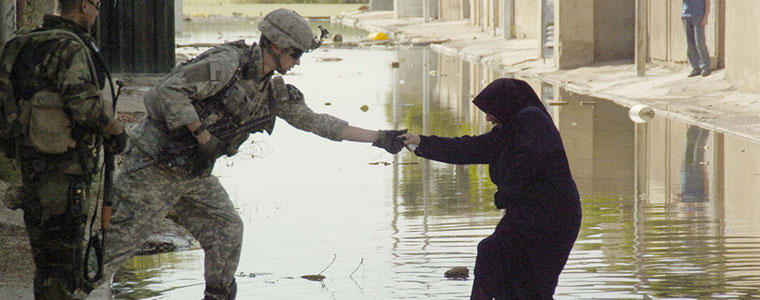As we commemorate the sacrifices made by our veterans this week, let’s take a moment and recall that Veteran’s Day is a day of hope and to recognize our soldiers for the hopeful work they do for civilians around the globe.

Although our military has been solidly engaged in humanitarian work for a long time, our national conversation on war often overlooks this aspect of the U.S. military’s presence on the ground around the world.
For good reasons, a firewall has always existed between the warriors engaged in active combat and the humanitarians who tend to the needs of war’s victims. That wall has been degrading as the enemy -- increasingly non-state actors -- deliberately operate in places with large civilian populations. Additionally, civilian aid workers now often arrive so early on the ground that the threat environment is still acute when they begin their work. The space between civilian and military in conflict zones has shrunk considerably, as the two worlds are inevitably thrown together in the field and the military now works in conjunction with non-military organizations to improve the lives of non-combatants.
A couple of years into the occupation of Iraq I helped establish and direct a women’s center in Baghdad. On one typically hot and sunny day in Baghdad, Captain Evans Hanson of the U.S. army approached me with an offer I wanted to refuse. He proposed to help in any way I liked to improve the center with new equipment and other support for the living conditions of the women who worked there. The women, war weary and suspicious, asked me to decline the support. The rules most humanitarian organizations worked under at the time delineated a distinct separation of humanitarian and military, so I curtly replied that the only way he could help was to stay as far away from my work as possible. Fortunately, Captain Hanson was unrelenting. He remained respectful of our request to keep a distance, but stayed in touch with me via phone and email to let me know he was always available if needed. Two months later I discovered a timed explosive outside the front gates of the center. I made a decision to evacuate the building, but was untrained in which steps to take next. I called Captain Hanson. His response saved our lives. He provided me with clear instructions and then he sent his team to diffuse the threat.
Captain Hanson continued to work around my resistance and concerns but eventually we developed a highly productive working relationship. We all felt safer when the U.S. Army built a security wall around the center. He understood the need not to be visible. To avoid the complications of bringing in foreign contractors, he hired Iraqi contractors. Like so many others in the military, Captain Hanson recognized the importance of developing and maintaining civilian infrastructures in order to win wars and keep people safe.
A recipient of numerous awards for valor, including the Bronze Medal, Captain Hanson died tragically in South Korea last year, the victim of friendly fire. On Veteran’s Day I take a few moments to honor and remember Captain Hanson, whose character and accomplishments are why the day is one of hope, not despair.
Our military’s concern for civilian stability in theatres of combat has yielded significant results, and is now an integral part of America’s overall security strategy. In Afghanistan, the U.S. Department of Defense’s Ministry of Defense Advisors (MoDA) has partnered military advisors with Afghan counterparts to help strengthen Afghanistan’s core bureaucratic competencies. This kind of civilian-military relationship is vital to the fortification of Afghanistan’s national security, which is as much about peace-building as it is about combat. The stronger the government in Afghanistan, the more stable an environment, and the less likely that U.S. forces need to remain in the country.
Our soldiers have also been active in building civilian infrastructure in places like East Africa, where some regional extremist groups have taken root. Military personnel from the U.S. Central Command’s Combined Joined Task Force-Horn of Africa (CJTF-HOA) have helped build schools and water supplies in countries like the Republic of Djibouti. This has helped to win the hearts and minds of civilians in the area, integral to the ultimate goal of mitigating threats of terrorism in the region.
The list goes on.
We must honor our troops’ sacrifice by remembering that the work they do is a source of great inspiration and hope. Though the nature of war has changed along with the methods of attaining victory, our veterans have adapted bravely to evolving circumstances. This Veteran’s Day, I think of Captain Hanson’s wife and two daughters. His family inspired him to offer me a hand. Let us honor the sacrifice of so many military families by recognizing the totality of their achievements.